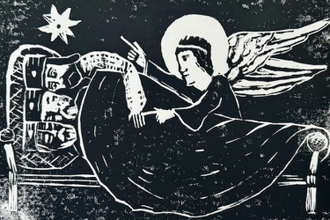Pope cancels university visit after Galileo protests
Pope Benedict has cancelled his scheduled visit today, to Rome's 'La Sapienza' University for the inauguration of the academic year, after students and professors staged lively protests about the Catholic Church's treatment of Galileo. In a statement, the Holy See Press Office said: "In the wake of the widely-publicised events of the last few days ... it was considered opportune to postpone the event. The Holy Father will, nonetheless, send the text of the speech he had been due to pronounce". The 'events' included a petition to the rector signed by 67 professors, asking for the invitation to Benedict XVI to be withdrawn, and protests by groups of students who yesterday occupied the rector's office to demand the right to demonstrate within the university campus on the day of the Pope's visit. The signatories of the petition take exception to a talk given by the then Cardinal Ratzinger in 1990, and in particular to a phrase he used on that occasion to the effect that "in Galileo's time the Church remained much more faithful to reason than Galileo himself. The trial against Galileo was reasonable and just". The future Pope's remarks, including a quote from a work by the philosopher of science Paul Feyerabend, were made in the context of a talk on the crisis of confidence in science, in which he used the example of changing attitudes towards the case of Galileo. Galileo, who is often called 'the father of modern physics' was praised by Isaac Newton and Einstein, for his pioneering work. But he was persecuted by the Church in his his own lifetime, particularly for his theory of 'heliocentrism' the discovery that the earth was not the centre of the universe. Many Biblical scholars took exception to this view. After many years of debate and discussion he was placed under house arrest and forbidden to write about his theories. He died in 1642. All official opposition to heliocentrism by the Church stopped in 1835 when his books works were dropped from the Index.. In 1979 Pope John Paul II asked the Pontifical Academy of Sciences to conduct an in depth study of the Galileo case". On 31 October 1993 they presented their conclusions to the Pope. In his address Pope John John Paul expressed regret at the way Galileo had been treated. Extracts from his address follow: 'By virtue of her own mission, the Church has the duty to be attentive to the pastoral consequences of her teaching.' 'From the Galileo affair we can learn a lesson which remains valid in relation to similar situations which occur today and which may occur in the future.' 'In Galileo's time, to depict the world as lacking an absolute physical reference point was, so to speak, inconceivable. And since the cosmos, as it was then known, was contained within the solar system alone, this reference point could only be situated in the earth or in the sun. Today, after Einstein and within the perspective of contemporary cosmology neither of these two reference points has the importance they once had. This observation, it goes without saying, is not directed against the validity of Galileo's position in the debate; it is only meant to show that often, beyond two partial and contrasting perceptions, there exists a wider perception which includes them and goes beyond both of them. 'Another lesson which we can draw is that the different branches of knowledge call for different methods. Thanks to his intuition as a brilliant physicist and by relying on different arguments, Galileo, who practically invented the experimental method, understood why only the sun could function as the centre of the world, as it was then known, that is to say, as a planetary system. 'The error of the theologians of the time, when they maintained the centrality of the earth, was to think that our understanding of the physical world's structure was, in some way, imposed by the literal sense of Sacred Scripture.' Source: VIS/Vatican















